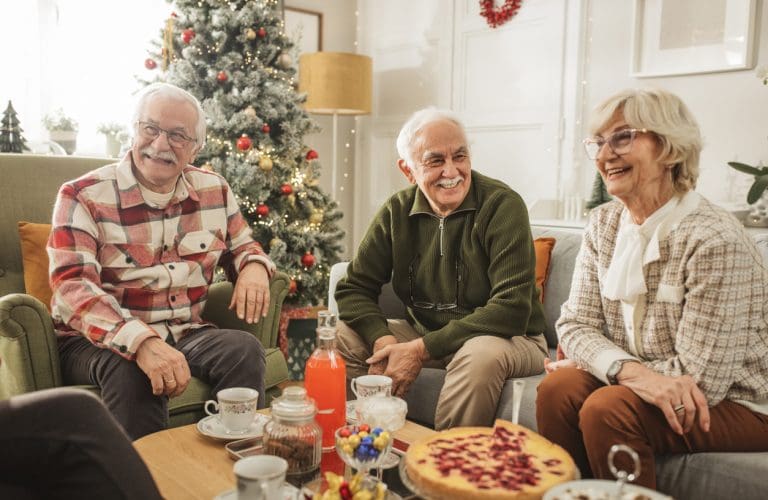Navigate Loneliness During the Holidays: Supporting Seniors in Building Connections

Navigating Loneliness During the Holidays: Supporting Seniors in Building Connections
The holiday season is often painted as a time of joy, togetherness, and celebration. However, for many seniors, it can be a season tinged with loneliness. Reminiscing about past celebrations can bring fond memories, but it can also highlight the absence of loved ones or a sense of disconnect, leaving seniors feeling more isolated than ever.
As an adult child, this time of year may be a mix of family holidays, parties with friends, shopping for presents, preparing large meals and feeling like you just saw your great aunt 2 weeks ago and somehow you’re once again sitting across from her at another holiday meal. The month of December can quickly become a blur as you spend time stopping in at the mall in between dropping your kids off at their activities. Before you know it, days, even weeks have gone by and you haven’t checked in on mom or dad since you saw them on Thanksgiving. Your holiday season might be jam packed and stressful, but for seniors, the time between holidays can feel isolating.
So what can you do? We share what to look out for, activities to try, and ways to stay connected this holiday season.
What is Loneliness?
Loneliness isn’t just about being physically alone; it’s about taking inventory of not just the connections, but the meaningful connections in your life. There’s a saying that goes something like, ‘Loneliness is a crowded room with no one to talk to’, or something along those lines. This is true for seniors and the holidays, do you ever look around during a holiday celebration and notice mom, dad, or grandma sitting in a room full of family, but by themselves? It is important to not only be surrounded by loved ones, but to feel fulfilled with meaningful and engaging connections.
Loneliness isn’t simply an emotional state; it has tangible effects on physical and mental health. Studies link chronic loneliness and social isolation to an increased risk of cardiovascular disease, dementia, stroke, depression, and anxiety. Factors like hearing and vision loss, which are common with aging, can compound feelings of social isolation, making it harder for seniors to stay engaged. As it starts to become more difficult for mom to hear across the table, she might not find connection at a rowdy family meal. When dad’s vision starts becoming an issue, he might have to stop driving himself to his usual social activities.
How to Help Seniors Combat Loneliness
Here are practical ways to help seniors feel more connected and supported during the holiday season—and beyond:
- Make Communication a Priority
Regular communication can make a world of difference. Whether it’s an in-person visit, a FaceTime call, or even a simple phone chat, consistency matters. We strongly encourage face to face interaction whether that be in person, on FaceTime or even Zoom, if you can talk face to face, make that a priority. Don’t wait until the holiday itself—start reaching out in the weeks leading up to it and keep the conversations going into the New Year. Small, frequent connections can help create a sense of belonging and continuity. These regular calls or visits will create meaning for your loved one, being engaged in your life and the life of your family will make the family holiday celebration that much more special to them. They are able to see and spend time with the granddaughter that they’ve heard so much about during those phone calls. - Encourage Social Engagement
Help your loved one discover local opportunities to connect with others. Churches, senior centers, libraries, and volunteer programs often host events or activities geared toward seniors, especially during the holiday season. These settings can be a great way to meet new people and feel part of a community. - Understand Their Needs
Everyone experiences loneliness differently. Take time to ask what your loved one needs to feel more connected. While some seniors might prefer large gatherings, others may feel more at ease in smaller, quieter interactions. Respect their preferences and adjust your efforts accordingly. - Acknowledge Holiday Triggers
The holidays can stir up both good and bad emotions. Simple triggers, like hearing a particular song or seeing a family heirloom, can bring memories flooding back. Be sensitive to these moments, and let your loved one share their feelings. Reminiscing together can be healing if done in a supportive way. - Building a Sense of Connection
Combating loneliness is about creating meaningful connections that last. By being proactive and understanding, you can help your loved one navigate the challenges of the holiday season with greater ease. Loneliness may be a subjective feeling, but your efforts to connect—whether big or small—can have a lasting impact on their emotional and physical well-being.
Let’s make this holiday season one of connection, care, and compassion. Because everyone deserves to feel seen, heard, and valued—especially during the most wonderful time of the year.
Do you feel like your mom or dad could benefit from more meaningful connections? We encourage you to consider visiting a Northbridge community near you. Our residents develop impactful friendships later in life. From sharing a meal in the dining room to going to the same exercise classes or discovering a hidden talent during our Artists in Residence Signature Program, there are plenty of opportunities to develop meaningful connections at Northbridge!
Please contact us if we can provide further information or if you would like to schedule a personalized tour.
Sources:
USANEWS
Mayo Clinic
NationalCouncilonAging